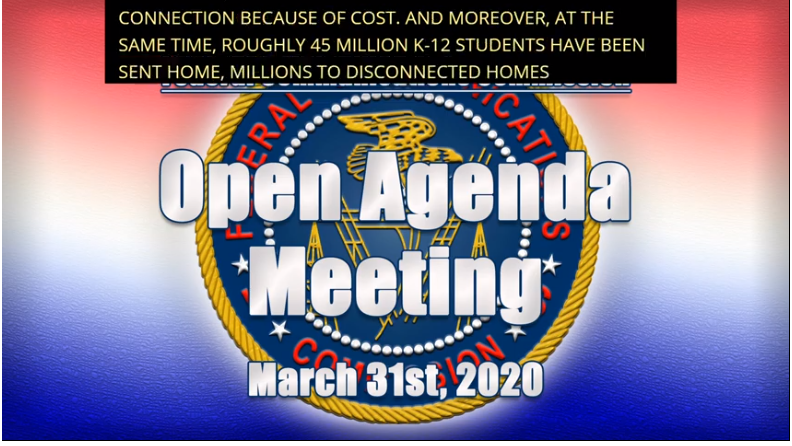FCC Gets Together, Apart, in Age of COVID-19

The smarter way to stay on top of the multichannel video marketplace. Sign up below.
You are now subscribed
Your newsletter sign-up was successful
The FCC held its mandatory monthly meeting via a brief, video-less, teleconference call Tuesday (March 31), with commissioners dialing in from home and the public able to access it over a never-more-important broadband connection.
The commissioners had already voted to approve all the meeting agenda items, and their time--the meeting lasted less than 20 minutes--was spent mostly talking about the pandemic and how they and the industry were dealing with it.
FCC chair Ajit Pai cited the 633 broadband companies and 17 trade associations that signed on to his pledge to keep America connected during the ongoing health crisis and the FCC staffers who had kept the commission up and running and working, mostly from home. He finished with some advice: "Stay healthy, Stay safe and Stay home."
Commissioner Michael O'Rielly only weighed in briefly, saying he was praying for everyone's safety on a daily basis. But he did have a request. Pai has circulated an item for a vote combining his framework for spending a $200 million emergency congressional authorization for telehealth that was in the COVID-19 aid package and a separate $100 million pilot telehealth program using Universal Service Fund subsidy money.
O'Rielly asked that the items be separated so he could vote the emergency package first and then take a little more time to vet the pilot program item.
Democratic commissioner Jessica Rosenworcel talked about the anxiety of dealing with the pandemic, an anxiety she said was hard to put into words, though she did quite eloquently. "It's a cruel pandemic that has crashed our economy and filled our hospitals and emptied our public spaces and tested our communications like nothing before," she said. "It may be the curse of the optimist, but I believe in the United States, when we fall, we rebound, when we see crisis we mobilize and when we are challenged to overcome, we do so with uncommon courage and extraordinary grace."
She gave a shout out to nurses and doctors, grocery store clerks and cleaning people, and dedicated FCC staffers. But she also had praise for communications industry players she often chides. "We're grateful, too, for those who keep communications up and running," she said. "We're thankful for those who broadcast the news and broadband providers who opened their networks, lifted data caps and fees and promised to not discontinue service."
The smarter way to stay on top of the multichannel video marketplace. Sign up below.
Rosenworcel also had some unusual praise for deregulation in this unusual time. "Good for this agency when it has waived rules in our programs to make it possible for more people to get the communications services they need."
But Rosenworcel said there is more that can be done given that the nation is online like never before.
She said it is not time to be timid, but for the FCC to use all its powers, including closing the homework gap, better tracking network outages to find and fill gaps, extending the Keep America Connected pledge to prepaid plans, and to extend the Lifeline subsidy program.
She said she would commit to vote the emergency portion of the telehealth item by end of day, but like commissioner O'Rielly was going to take more time with the pilot program item.
Commissioner Brendan Carr said his heart went out to all impacted by the virus and its "uncharted territory," and said the country would emerge stronger and more prosperous in time. In the meantime, he said the internet and telecom networks are more important than ever, and according to the data he had seen, could handle the load.
"We've been in constant contact with internet providers and third party application providers alike monitoring network traffic and putting out information on that," he said. He said the network performance data shows that those networks are "strong and resilient" and that the pandemic-related surge in traffic is "well within the capacity of the U.S. networks."
Commissioner Geoffrey Starks called for an FCC stimulus package of its own. "The time to expand affordable broadband options and a Lifeline for struggling Americans is now," he said, adding that no American should go without a connection because of cost.
"For the first time ever in responding to an emergency pandemic, Americans will rely on the Internet extensively for an indeterminate amount of time," he said. "When public health requires social distancing and quarantine, the digital divide becomes central to our collective safety and our economic security. The time to close that digital divide with that same sense of urgency we summon to fight the pandemic is now."
The next public meeting will be April 23, likely the same teleconference format.
Contributing editor John Eggerton has been an editor and/or writer on media regulation, legislation and policy for over four decades, including covering the FCC, FTC, Congress, the major media trade associations, and the federal courts. In addition to Multichannel News and Broadcasting + Cable, his work has appeared in Radio World, TV Technology, TV Fax, This Week in Consumer Electronics, Variety and the Encyclopedia Britannica.

